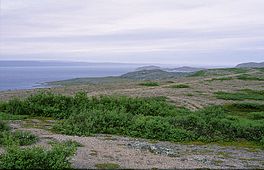| Varangerfjorden | |
|---|---|
| |
 View of the fjord View of the fjord | |
| Interactive map of the fjord | |
| Location | Finnmark county, Norway |
| Coordinates | 70°05′28″N 31°00′33″E / 70.0911°N 31.0091°E / 70.0911; 31.0091 |
| Type | Fjord |
| Primary outflows | Barents Sea |
| Ocean/sea sources | Barents Sea |
| Basin countries | Norway |
| Max. length | 100 kilometres (62 mi) |
| Max. width | 70 kilometres (43 mi) |
| Settlements | Vardø, Vadsø |
The Varangerfjord (English: Varanger Fjord; Russian: Варангер-фьорд, Варяжский залив; Finnish: Varanginvuono; Northern Sami: Várjavuonna) is the easternmost fjord in Norway, north of Finland. The fjord is located in Finnmark county between the Varanger Peninsula and the mainland of Norway. The fjord flows through the municipalities of Vardø, Vadsø, Nesseby, and Sør-Varanger. The fjord is approximately 100 kilometres (62 mi) long, emptying into the Barents Sea. In a strict sense, it is a false fjord, since it does not have the hallmarks of a fjord carved by glaciers.
Its mouth is about 70 kilometres (43 mi) wide, located between the town of Vardø in the northwest and the village of Grense Jakobselv in the southeast. The fjord stretches westwards inland past the town of Vadsø to the village of Varangerbotn in Nesseby Municipality.
History
The Kven residents of Varangerfjord are largely descendants of Finnish immigrants who arrived to the area during the 19th century from Finland and northern Sweden.
During the first half of the 19th century, the possibility of Russia demanding the cession of a stretch of coast along the Varangerfjord was for some time on the European diplomatic agenda, inducing King Oscar I of Sweden and Norway to conclude an alliance (1855) with Britain and France in order to forestall this possibility.
Important Bird Area
A 55,450 ha area comprising the northern coast of the fjord and the nearby islands of Hornøya and Reinøya, including intertidal and neritic habitats as well as coastal wetlands and tundra grassland, has been designated an Important Bird Area (IBA) by BirdLife International because it supports large numbers of waterbirds, seabirds and waders, either breeding or overwintering. These include lesser white-fronted geese, long-tailed ducks, king eiders, common eiders, Steller's eiders, velvet scoters, red-breasted mergansers, yellow-billed loons, purple sandpipers, black-legged kittiwakes, glaucous gulls, Arctic herring gulls, Atlantic puffins and common murres.
References
- Van Dyke, Carl (2013). The Soviet Invasion of Finland, 1939–40. London: Frank Cass. p. 26.
- Ratcliffe, Derek (2010). Lapland: A Natural History. London: T & AD Poyser. p. 237.
- Odner, Knut (1992). The Varanger Saami: Habitation and Economy AD 1200–1900. Oslo: Scandinavian University Press. p. 42.
- Store norske leksikon. "Varangerfjorden" (in Norwegian). Retrieved 2013-03-01.
- "Varangerfjord (including Hornøya and Reinøya)". BirdLife Data Zone. BirdLife International. 2021. Retrieved 2021-12-04.
External links
- [REDACTED] Media related to Varangerfjorden at Wikimedia Commons
This article about a location in Finnmark is a stub. You can help Misplaced Pages by expanding it. |
This article about a fjord in Norway is a stub. You can help Misplaced Pages by expanding it. |